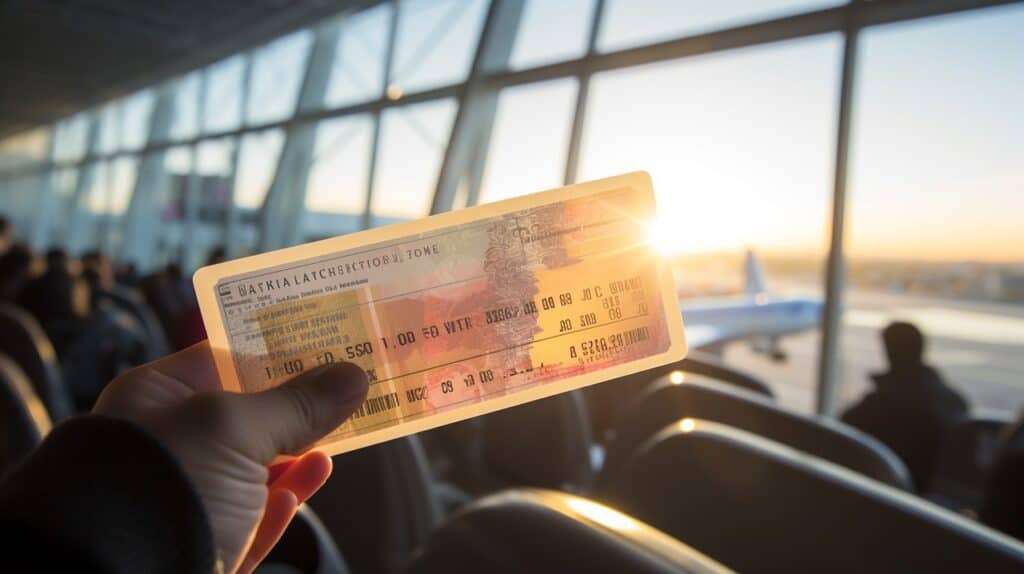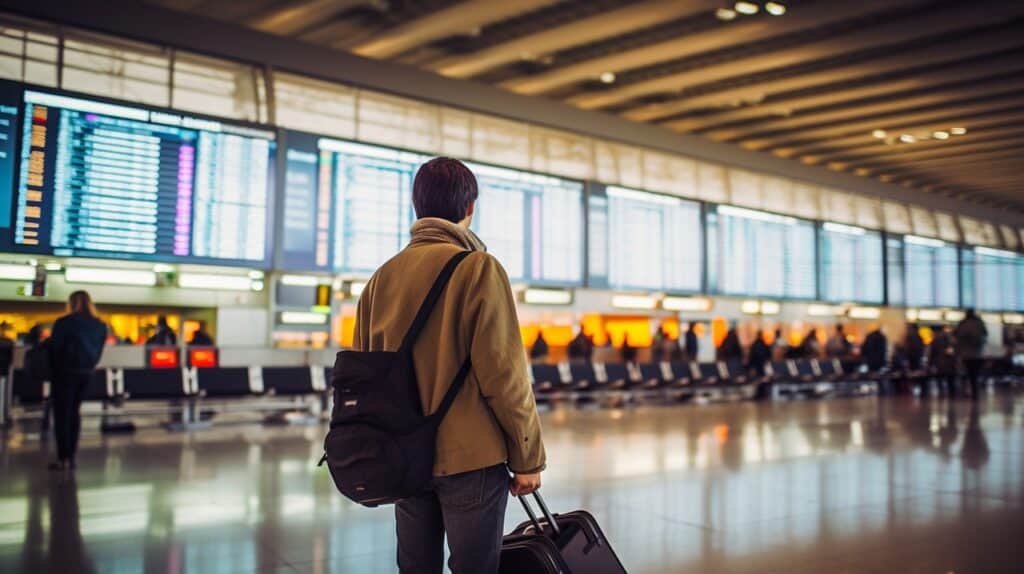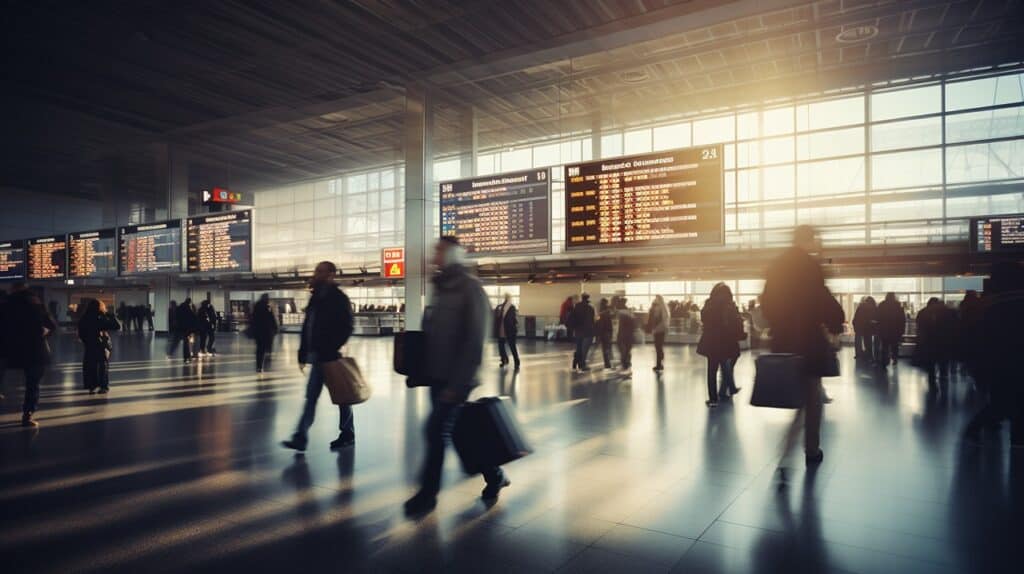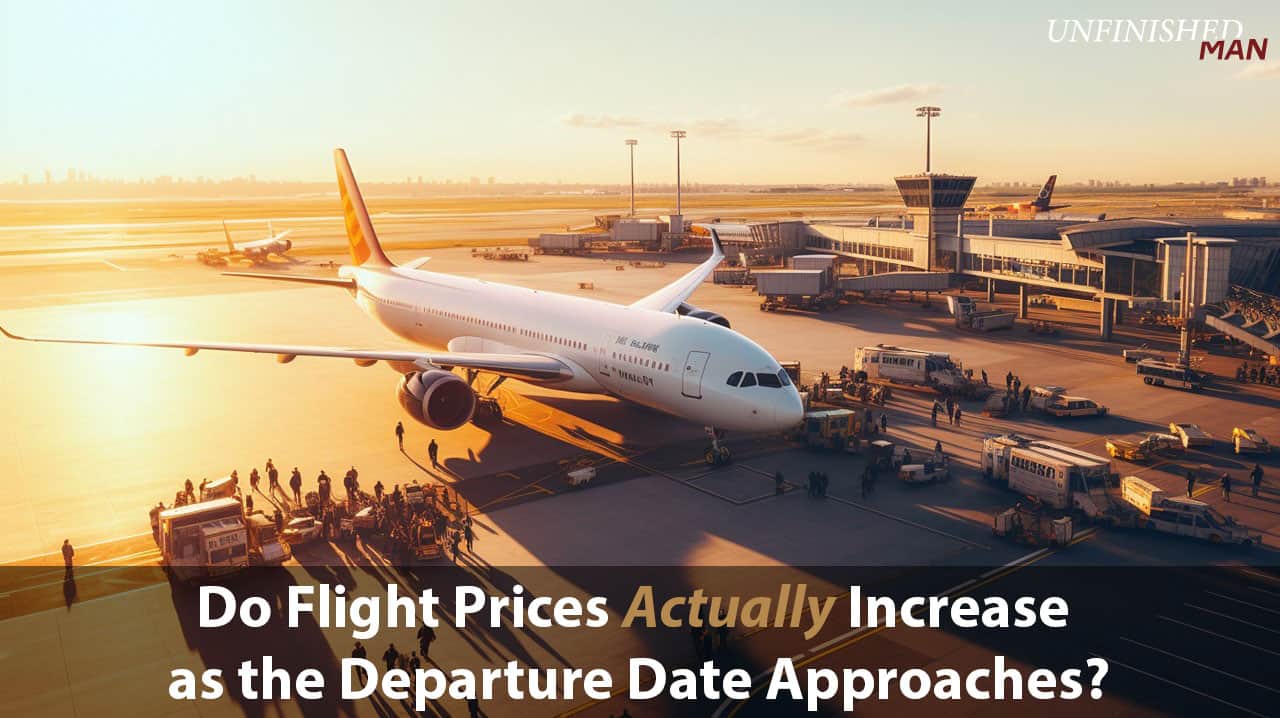Ever puzzled why flight prices seem to skyrocket as your travel date looms closer? Trust me; I’ve been there too. Armed with research from CheapAir.com’s analysis of over 917 million flights and my own seasoned traveler insight, this blog post is here to demystify airline pricing trends for you.
Get ready to navigate the world of airfare like a pro!
Key Takeaways
Flight prices tend to rise after four months and continue climbing until about three weeks before the departure date, debunking the common belief that prices get cheaper as the travel date approaches.
Factors such as demand and yield management, competition and price matching, dynamic pricing based on booking time, and seasonal and weekly price variations all impact flight ticket pricing.
Popularity of the destination, number of seats sold, flight cancellations, fuel prices, and historical analysis are important factors affecting flight prices. Understanding these dynamics can help travelers make informed decisions when booking flights.
While there may be tendencies in seasonal and weekly price variations, finding the best flight price requires patience and smart tactics. Booking between four months and three weeks ahead of time is generally recommended for securing cheaper fares.
Table of Contents
Understanding Airline Ticket Pricing

Airline ticket pricing is influenced by various factors, including demand and yield management, dynamic pricing based on booking time, competition, and price matching, as well as seasonal and weekly price variations.
Demand and Yield Management
Let’s dive right into the heart of airline ticket pricing – demand and yield management. These two key factors play a significant role in how airlines price their tickets. In layman’s terms, they’re all about balance, the perfect equilibrium between supply (the number of available seats on a flight) and demand (how many people want those seats).
And, guys, it gets more complicated than that. To maximize revenue – or what we call yield management in fancy lingo – airlines constantly adjust prices based on various conditions.
They consider things like historical trends, real-world events, fuel prices, and even whether there’s a big event like the Superbowl happening at your destination! It’s quite a poker game they’re playing where high stakes are always on the line: filling every seat without leaving money on the table by underpricing them.
So essentially, these two elements work together behind the scenes to determine just how much you’ll need to shell out for that next holiday or business trip ticket.
Dynamic Pricing Based on Booking Time
Guys, let’s talk about dynamic pricing and how it impacts your flight cost. It’s a cool concept that airlines use to adjust ticket prices in real-time based on factors like demand, competition, and timing.
According to CheapAir.com research involving over 917 million flights in 8,000 markets (yes, you read right—917 million!), there are six booking zones to keep in mind if you want the best bang for your buck.
The Prime Booking Window is particularly interesting—it kicks in about four months before departure and lasts till roughly three weeks out, when prices tend to be lowest. But beware; after this golden period comes the phase they call ‘Playing with Fire,’ where rates begin their upward climb as supply decreases and demand increases!
Competition and Price Matching
In the wild world of airline ticket prices, there’s a covert battle waged every day. A little-known fact is that most airlines are fierce price matches. You see, each airline has its own algorithm for crunching numbers and analyzing market trends to set flight fares.
But they’re not operating in a bubble – oh no! They’re keeping an eagle eye on their competitors too. As soon as one drops its airfare for a certain route or offers some fancy promotion, you can bet your boots others follow suit faster than you can say “cheap flights.”
In fact, this competition among airlines directly influences how flight prices fluctify as the departure date approaches. It’s like watching two dogs fighting over a bone – only this time, it’s about who offers the best travel deal!
Seasonal and Weekly Price Variations
Let me tell you, fellas, the price of your flight ticket can swing faster than a pendulum, all thanks to the seasonal and weekly price variations. These fluctuations are usually determined by factors such as holidays, school vacation times, and even the weather.
Here’s a handy little chart to break it down:
| Season | Average Flight Price Variation |
|---|---|
| Winter | Flights tend to be more expensive, especially in December, due to Christmas and the holiday season. |
| Spring | Prices may go down, depending on the destination. However, Easter can cause a price bump. |
| Summer | Peak travel season means higher prices, particularly for popular vacation spots. |
| Fall | Generally cheaper as it’s considered off-peak season, but Thanksgiving can see a surge in prices. |
And here’s another chart to help you understand how prices might vary throughout the week:
| Day of the Week | Average Flight Price Variation |
|---|---|
| Monday | Not typically a significant variation in prices. |
| Tuesday | Not typically a significant variation in prices. |
| Wednesday | Often the cheapest day to fly. |
| Thursday | Prices tend to creep up as the weekend approaches. |
| Friday | Typically more expensive due to increased demand for weekend departures. |
| Saturday | Varies, but often more expensive due to weekend travelers. |
| Sunday | Can be expensive, especially for return flights, as travelers head home for the workweek. |
These are tendencies, not set-in-stone rules. Factors such as the popularity of the destination and the time between the purchase and the flight can also cause ticket prices to swing. Just remember – finding the best flight price is a bit like hunting for a needle in a haystack. But with a bit of patience and smart tactics, you can score a great deal.
Myth Busting: Do Prices Really Rise as Departure Date Approaches?

As someone who loves to travel, I’ve often wondered if flight prices really go up as the departure date gets closer. Well, after delving into the world of airline ticket pricing, I can confidently debunk this myth! Contrary to popular belief, plane tickets usually don’t get cheaper the closer you get to your departure date.
In fact, according to CheapAir.com’s extensive study analyzing over 917 million flights in 8,000 markets, rates actually tend to rise after four months and continue climbing until about three weeks before your trip.
So if you’re looking for the cheapest fares, it’s best to book between four months and three weeks ahead of time. Don’t fall into the trap of waiting till the last minute – that could end up costing you more than necessary!
The Dynamics of Flight Prices
Flight prices are influenced by various factors, including the popularity of the destination, the number of seats sold, flight cancellations, fuel prices, and historical analysis.
Popularity of the Destination
I’ve got to say, guys, the popularity of a destination can really shake up flight prices. When a place becomes more popular, you better believe the airlines are going to take advantage of that demand and jack up those prices.
It’s all about supply and demand in this crazy airline industry. So if you’re planning on jetting off to a trendy hotspot or an Instagram-worthy location, be prepared to pay a pretty penny for your ticket.
But hey, sometimes it’s worth it for that unforgettable vacation experience, right? Just be sure to keep an eye out for any deals or discounts that might come your way. Happy travels!
Number of Seats Sold
Here’s the deal: the number of seats sold on flights can seriously impact ticket prices. It all comes down to supply and demand. When a flight is in high demand, and there are limited seats available, prices tend to skyrocket.
On the flip side, if a flight isn’t filling up as quickly as expected, airlines may slash prices to ensure they fill those empty seats. So, when it comes to nabbing the cheapest flight possible, keep an eye out for how many seats have already been booked – it could save you some serious cash.
Flight Cancellations
One factor that can affect flight prices as the departure date approaches is the occurrence of flight cancellations. When airlines cancel flights, it can lead to a decrease in available seats and potentially drive up ticket prices.
Flight cancellations can happen for various reasons, such as bad weather conditions, technical issues with the aircraft, or even changes in airline schedules. These unforeseen events disrupt travel plans and impact pricing dynamics.
It’s important to keep in mind that flight cancellations are unpredictable and can occur at any time, so it’s always a good idea to stay informed and be prepared for any potential changes when booking your flights.
Fuel Prices
Fuel prices play a significant role in determining flight ticket prices. As the departure date approaches, airlines may increase fares due to rising fuel expenses. This is because fuel costs directly impact an airline’s operational costs, and these additional expenses are often passed on to consumers.
So, if you notice flight prices going up as your travel date gets closer, it’s likely due to the fluctuating fuel prices. However, it’s important to keep in mind that fuel expenses are just one factor influencing ticket prices – market demand and other external factors also come into play.
So buckle up and be prepared for possible fluctuations in flight fares as those pesky fuel costs continue to soar!
Historical Analysis
Ladies and gentlemen, let’s take a dive into the archives and get the scoop on historical analysis of flight prices. It’s like time travel, only cheaper and without the unsightly DeLorean.
| Historical Event | Effect on Flight Prices |
|---|---|
| Seasonality | Seasonal fluctuations have always rocked the boat in the airline industry. For instance, ticket prices hike during December, the time for Santa and overcooked turkeys, because everyone and their mother wants to fly home. |
| Day of the Week | The day you book doesn’t affect the price, despite the rumors you might have heard at the bar. So, you can as well book your flight on a Tuesday while sipping your fourth espresso. |
| Four Months to Three Weeks Before Departure | According to our pals over at CheapAir.com, who critically looked at over 917 million flights in 8,000 markets, the sweet spot for scoring the best deals lies between four months and three weeks before your departure. So start marking your calendars, gentlemen. |
| Thanksgiving Week | Here’s a fun fact: The best time to buy for fall travel is 69 days in advance, but if you’re planning to stuff yourself silly with turkey, you better book your Thanksgiving week flight even earlier. |
| Flight to Hawaii | And for your Hawaiian dream vacation, keep in mind that ticket prices fluctuate more than the ocean waves. So, keep an eye on those alerts and grab your surfboard when the price is right. |
Keep these historical trends in mind, gentlemen, as you plan your next jet-setting adventure. No need to thank me, just remember to send a postcard.
When Do Flight Prices Typically Drop?

Flight prices typically drop during airline sales and at certain times of the year, offering travelers the opportunity to secure the best deals for their upcoming trips.
During Airline Sales
Airline sales can be a great opportunity to snag discounted flight prices. Here are some key points to keep in mind:
- Airline sales often offer significant discounts on flights, allowing you to save big on your travel expenses.
- These sales typically occur during certain times of the year, such as Black Friday or Cyber Monday, when airlines offer special promotions and deals.
- Keep an eye out for email newsletters or social media announcements from airlines, as they often announce their sales through these channels.
- Take advantage of flash sales, which are limited-time offers that can result in even greater savings on your flight tickets.
- Booking during an airline sale doesn’t necessarily mean sacrificing quality or convenience. Many airlines offer discounted fares for their regular flights, allowing you to enjoy the same level of service at a lower price.
- It’s important to act quickly during airline sales, as the best deals may sell out fast. Make sure you have all your travel details ready before the sale begins so that you can secure your desired flights promptly.
- Remember to compare prices across different airlines and booking platforms before making your purchase. While an airline sale might offer a good deal, it’s always a good idea to do some research to ensure you’re getting the best price available.
Certain Times of the Year
As someone who loves to travel, it’s important to know when the best times of the year are to book your flights. Here are some key periods to keep in mind when planning your next trip:
- Holiday Sales: Keep an eye out for holiday sales, especially during national holidays like New Year, Christmas Day, and Thanksgiving Day. Airlines often offer special promotions and discounted fares during these times.
- Off-Peak Seasons: Traveling during off-peak seasons can save you a significant amount of money on flights. These are typically times when tourist destinations are less crowded, such as early spring or late fall.
- 45-90 Days Out: According to CheapAir.com, the optimal time to buy fall travel is around 69 days in advance. This applies to most flights except for Thanksgiving week, which should be booked earlier.
- Flight Prices Based on Month: The month you choose to travel can also have an impact on ticket prices. For example, December tends to be a more expensive month due to increased demand during the holiday season.
- Flight Prices Based on Destination: Popular vacation spots and high-demand destinations often have higher ticket prices compared to less frequented locations. If you’re open to exploring new places, consider booking flights to lesser-known destinations for potential savings.
Tips for Securing the Best Flight Prices
To secure the best flight prices, avoid weekend and holiday travel, sign up for price alerts, and consider layovers for potential savings.
Avoiding Weekend and Holiday Travel
Weekends and holidays are the busiest times for travel, which means higher demand and higher prices. To save money on your flights, consider avoiding travel during these peak periods. Here’s why:
- Weekends are popular for leisure travel, which drives up ticket prices. Choosing to fly during the week can often result in lower fares.
- Holidays, such as Christmas and Thanksgiving, see a surge in travelers wanting to be with their loved ones. Booking outside of these holiday periods can help you find better deals.
- Airlines often increase prices during major holidays when demand is at its highest. By avoiding these peak dates, you can take advantage of lower fares.
- Traveling on weekdays also means fewer crowds and shorter lines at airports, making your journey more enjoyable.
- If you have flexibility in your travel plans, consider flying on less popular holidays or choosing alternate dates around busy weekends to score better deals.
Signing Up for Price Alerts
If you’re looking to score the best flight prices, one strategy that can’t be overlooked is signing up for price alerts. This simple step can help you stay informed and snag the lowest fares when they become available. Here’s why it’s worth considering:
- Stay in the loop: By signing up for price alerts, you’ll receive notifications whenever there are significant changes in flight prices. This way, you won’t have to constantly check airline websites or search engines to see if there’s a better deal.
- Capitalize on timing: Flight prices can fluctuate dramatically within a short period of time. With price alerts, you’ll be able to catch those moments when prices drop and secure your tickets at the most affordable rates.
- Be flexible with your travel plans: Price alerts allow you to have more flexibility with your travel dates. You can set up alerts for specific destinations and choose to receive notifications for any changes in prices over a range of dates. This gives you the opportunity to adjust your itinerary based on fluctuations in fares.
- Plan ahead: Price alerts are especially beneficial if you like to plan your trips well in advance. If there’s a specific destination or date range that you have in mind, setting up alerts will keep you informed about any price drops or promotions that may arise.
- Take advantage of rewards credit cards: When you sign up for price alerts, it’s also an excellent time to make use of rewards credit cards. Many credit card companies offer perks such as airline miles or points that can be applied towards future flights, potentially helping you save even more money.
Considering Layovers
When it comes to finding the best flight prices, considering layovers can make a significant difference. Sometimes opting for a longer layover can result in substantial savings on your airfare.
Airlines often offer lower prices for flights with multiple stops as they are trying to fill up seats on less popular routes. So don’t be afraid of adding some extra time to your travel itinerary if it means getting a better deal! Plus, having a layover can give you the opportunity to explore a new city or take a break from long hours spent in an aircraft cabin.
Just remember to factor in the duration and location of the layover when making your decision.
Flight Price Increase FAQs as Departure Date Approaches
Do flight prices tend to increase as the departure date approaches?
Flight prices can indeed increase as the departure date gets closer. This is because airlines often raise prices in order to take advantage of last-minute travelers or individuals who have urgent travel needs.
Are there any ways to find cheaper flights even close to the departure date?
While it may be more challenging, there are still ways to find cheaper flights close to the departure date. It’s recommended to be flexible with your travel dates and times, use price comparison websites or apps, sign up for airline newsletters for promotional offers, and consider booking connecting flights instead of direct ones.
Can booking a flight far in advance help me save money?
Booking a flight well in advance can sometimes lead to lower prices compared to waiting until closer to the departure date. However, this is not always guaranteed, as airline pricing strategies can vary. Monitoring fares regularly and being aware of seasonal trends can help determine if booking early will provide savings.
What factors influence flight prices as the departure date approaches?
Several factors can impact flight prices as the departure date approaches. These include demand for seats on that particular route, availability of seats on a specific flight, time of year (high vs low season), competition among airlines servicing that route, and external events such as holidays or major conferences taking place near your destination city.
Conclusion
In conclusion, while there is a common belief that flight prices increase as the departure date approaches, this is not always the case. The dynamics of flight pricing are influenced by various factors such as destination popularity, number of seats sold, fuel prices, and historical analysis.
It’s important for travelers to stay informed about airline sales, consider certain times of the year for cheaper fares, and utilize tips like signing up for price alerts and considering layovers to secure the best flight prices.
So don’t let the myth intimidate you – with some strategic planning and a little luck, you can find great deals on flights even close to your departure date.



